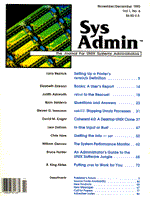
Listing 1: runsql/runsql2
# # runsql: Execute RDSQL script, discard stdout and stderr streams # runsql2: Same, do not discard stdout and stderr. # # Written by Leor Zolman, 7/92 # # usages: # runsql.sh <database> [scriptfile] # (stdout and stderr stream output discarded) # # runsql2.sh <database> [scriptfile] >outstream 2>errstream # (stderr and stdout steams passed through unchanged) # # Both read sql script from scriptfile, or from standard input # if no file given. # # Example (from within a shell script): # # runsql2 accounts >sql.out 2>sql.err <<END # unload to "table.txt" # select * from table; # END # # NOTES: # 1. If script is fed from the standard input, no "database" # statement is necessary. If the filename method is used, # then the "database" statement IS required in the input file. # [ $# -lt 1 ] && echo "usage: $0 <database> [scriptfile]" && exit if [ $# -eq 2 ] then if [ ! -r $2 ] then echo "$0: script file $1 not found." >&2 exit 1 fi if [ `basename $2 .sql`.sql != $2 ] # make sure file name ends in .sql then scriptfile=`tmpname`.sql # if not, create a temporary file cp $2 $scriptfile # copy script file to it chmod 777 $scriptfile usingtmp=Y # set flag so we erase temp file later else scriptfile=$2 fi else scriptfile=`tmpname`.sql cat >$scriptfile <<-END database $1; END cat >>$scriptfile usingtmp=Y fi if [ $0 = runsql2 ] then isql -s $1 -qr $scriptfile # save output streams else isql -s $1 -qr $scriptfile >/dev/null 2>&1 # discard output streams fi [ "$usingtmp" = Y ] && rm $scriptfile
|